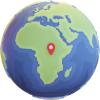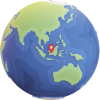Case studies are organised by region, with each region featuring links to the countries where the case studies are located.
Senegal

According to Mongabay, intensive illegal logging, driven by growing consumer demand in China, has decimated Pterocarpus erinaceus (rosewood) trees in Senegal’s southern region of the Casamance, which borders the Gambia.. Despite the introduction of an export ban and increased border patrols, trafficking has worsened, with the Gambia becoming a hub for smuggling rosewood to China from the Casamance region in Senegal. It has been reported that approximately 1.6 million rosewood trees were illegally logged from the Casamance and exported from the Gambia to China between June 2012 and April 2020.
The inefficacy of bans and patrols can in part be attributed to the high levels of unemployment and poverty in the region that pushes locals to participate in the illegal trade. In addition, corruption exists on both sides of the Senegal-Gambia border, further facilitating trafficking and the illegal trade. Deforestation from this illegal trade has disrupted local ecosystems, influenced rainfall, and overall decreased agricultural productivity. This affects local communities that rely on the forest for livelihoods.
Keywords: Sub-Saharan Africa, Senegal, timber, primary production, illegal logging, illegal timber trade, corruption and bribery, deforestation, smuggling
Sources: https://news.mongabay.com/2020/11/chinese-demand-and-domestic-instability-are-wiping-out-senegals-last-forests/#:~:text=Illegal%20logging%20took%20hold%20around,and%20the%20presence%20of%20rebels

A report by Enact Africa details how illegal mining in Senegal, particularly in the south-eastern Kédougou region, has caused immense tax revenue losses and severe environmental degradation. Illegal miners, predominantly Chinese groups, entered Kédougou in 2017, where they initially operated in buffer zones by paying legitimate local Ghanaian companies for the use of their licences to mine illegally. Following this illegal activity, the region has faced severe water pollution. The Niokolo-Koba National Park, a protected zone, has also been infiltrated by illegal miners, damaging the ecosystem.
Corruption and bribery fuel in large part this illegal mining in the region. Indeed, bribes ranging from CFA 12 million to 16 million (US$20,491 to US$27,321) per week are paid to local officials and park authorities to allow mining operations to continue. Bribes also extend to local leaders, who are paid to remain silent about the environmental damage and community disruptions. Overall, it is estimated that the Senegalese government loses approximately CFA 4 billion (US$6.83 million) annually due to illegal mining activities. The corruption and illegal mining practices also harm local economies, exacerbating poverty and limiting legitimate economic development.
Keywords: Sub-Saharan Africa, Senegal, minerals, primary production, illegal mining, corruption and bribery, tax evasion, human rights violations
Sources: https://enactafrica.org/research/trend-reports/how-corruption-is-fuelling-illegal-mining-in-senegal

The article reports on a criminal investigation by Swiss authorities into alleged timber pillaging in Senegal and The Gambia. The investigation targets a Swiss timber company accused of illegally sourcing timber from these West African countries, where deforestation and environmental degradation are significant concerns. Local communities and environmental groups accuse the company of exploiting loopholes in regulations, conducting illegal logging, and contributing to habitat destruction and loss of biodiversity.
Swiss authorities are probing potential violations of Swiss laws on economic crime and environmental protection. The case underscores broader issues of corporate responsibility, environmental stewardship, and the exploitation of natural resources in developing countries. It highlights the need for international cooperation and stricter enforcement of laws to combat illegal logging and protect vulnerable ecosystems.
Keywords: Sub-Saharan Africa, Senegal, timber, primary production, illegal logging, deforestation, corporate responsibility
Source: https://www.business-humanrights.org/en/latest-news/pillaged-timber-in-senegalthe-gambia-swiss-authorities-have-opened-a-criminal-investigation/


The Environmental Crimes Financial Toolkit is developed by WWF and Themis, with support from the Climate Solutions Partnership (CSP). The CSP is a philanthropic collaboration between HSBC, WRI and WWF, with a global network of local partners, aiming at scaling up innovative nature-based solutions, and supporting the transition of the energy sector to renewables in Asia, by combining our resources, knowledge, and insight.


